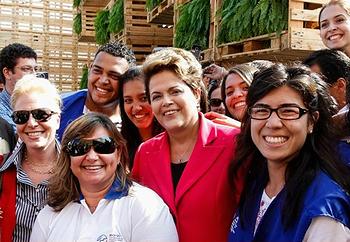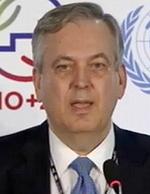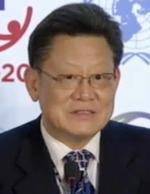Rio+20 Sustainable Development Summit Opens in Brazil
RIO de JANEIRO, Brazil, June 13, 2012 (ENS) - President Dilma Rousseff today opened Rio +20, the UN Conference on Sustainable Development, at Brazil's giant pavilion in Athletes Park opposite Riocentro, the main seat of the conference meetings.
President Rousseff urged compromise among all countries of the world to achieve sustainable development goals, especially the developed nations facing economic crises.
 |
Brazil's President Dilma Rousseff, center, at the opening of Brazil's Rio+20 pavilion (Photo courtesy Office of the President) |
"We do not consider that respect for the environment only occurs in the expansion phase of the cycle. Rather, a pro-growth position, to preserve and maintain, is intrinsic to the design of development, particularly in the face of crisis," said Rousseff.
"The environment is not a prop," she said. "It is part of the vision."
About 55,000 people are expected to attend Rio +20, including at least 134 world leaders who will participate in the high-level segment from June 20-22.
More than 180 delegations from the 193 UN member countries will attend the event, which builds upon the 1992 Rio Earth Summit where the pattern was set for the sustainable development of today.
The developing countries of the G77 + China group have submitted a proposal to create a fund of $30 billion that would finance sustainable development in developing countries.
"The G77 + China group has the idea of creating a $30 billion fund for sustainable development," said Brazil's chief negotiator at the conference, Ambassador Luiz Figueiredo at a news conference today at Riocentro. "This is a proposal that has the support of this group and is part of the negotiations."
At the news conference, Ambassador Sha Zukang of China, the top UN official responsible for the Rio +20, requested that delegates speed up their deliberations on the final outcome document.
 |
Ambassador Luiz Figueiredo (Photo courtesy Rio+20) |
 |
Ambassador Sha Zukang (Photo courtesy Rio+20) |
"Today we begin the final stretch in the marathon negotiation process. Delegates will clear brackets and fine tune the text before the official conference starts next week," Sha said. "We are negotiating a focused political outcome. This outcome, as has been repeatedly emphasized, should be action oriented."
"From now on we are in the homestretch. We should drastically speed up negotiations. The whole world is watching us and we cannot disappoint them," he said. "We need an ambitious and historic document, with a strong commitment to create positive global change. We will use these final days to turn our aspirations and dreams into reality."
To facilitate the negotiations, Sha said that representatives of UN member states shared the final draft in five parts, under the responsibility of two discussion groups - one in charge of issues relating to the global green economy and the other handling implementation mechanisms for agreements and targets for action.
Sha said the official agreements would gain strength from voluntary commitments made by civil society, business and government. "They will complement the agreement official actions focused on promoting renewable energy, agriculture and sustainable transport. It is an important legacy," he said.
The Greenpeace ship Rainbow Warrior arrived in Rio today bringing Greenpeacers to participate in civil society discussions after visiting the Brazilian cities of Manaus, Macap, Belem, Recife and Salvador.
 |
A river winds through Brazilian forest to empty into the Atlantic Ocean (Photo by Greenpeace Brasil) |
In Manaus in March, Greenpeace launched a public initiative for zero deforestation of the Brazilian Amazon, which has attracted the support of social movements, indigenous organizations, artists and other members of civil society. The idea is to collect 1.4 million signatures of voters, to present Congress with a popular initiative to end deforestation. More than 300,000 signatures have been collected. The Brazilian Congress is now debating changes that relax the Forest Code and the partial veto of those changes made by President Rousseff.
Greenpeace Zero Deforestation campaign coordinator Marcio Astrini lamented that the protection of Brazilian forests was left out of discussions on the Brazilian Forest Code. "We understand that in the National Congress, the discussion revolved around forgiving environmental crimes, legalizing deforestation that occurred in the past," he said.
"Brazil is not only an important country because of the leadership that it can take on this issue, but the development of sustainable energy can be economically very favorable to the country," he said.
The 1992 Rio Earth Summit resulted in three international treaties or conventions - the Convention on Biological Diversity, the United Nations Framework Convention on Climate Change, and the United Nations Convention to Combat Desertification.
Twenty years later, governments and civil society organizations are back in Rio to take stock of the ways these agreements have enabled the world to address the related challenges of climate change and biodiversity, desertification and land degradation.
 |
National flags at Forte de Copacabana, June 13, 2012 (Photo by Alexandre Macieira courtesy Riotur) |
In Athletes Park, a pavilion dedicated to the three conventions will serve as a platform for raising awareness and sharing information on the benefits that can be realized through their implementation. The pavilion is a collaborative effort among the three secretariats and the funding agency created at the 1992 Earth Summit, the Global Environment Facility.
Rio residents are feeling the mood of the conference. On the edge of the southern area, where hotels are concentrated, Army soldiers stand guard with rifles beside camouflaged Humvees. At sea, warships are patrolling.
Rio+20 stickers on the doors of hotels, buses and vans identify businesses serving participants from around the world who are attending the event.
This morning, Fatima Esteves visited a Rio +20 exhibit at the Forte de Copacabana onRio's famous Copacabana beach. "I'm finding that people and the authorities are mobilized much more now than at the time of Rio '92," she said.
Walking with two friends in Rio, Resident Niteroi Gisela Reichert said, "This is the climate of Rio +20, but I want to know the result it will have."
Copyright Environment News Service (ENS) 2012. All rights reserved.